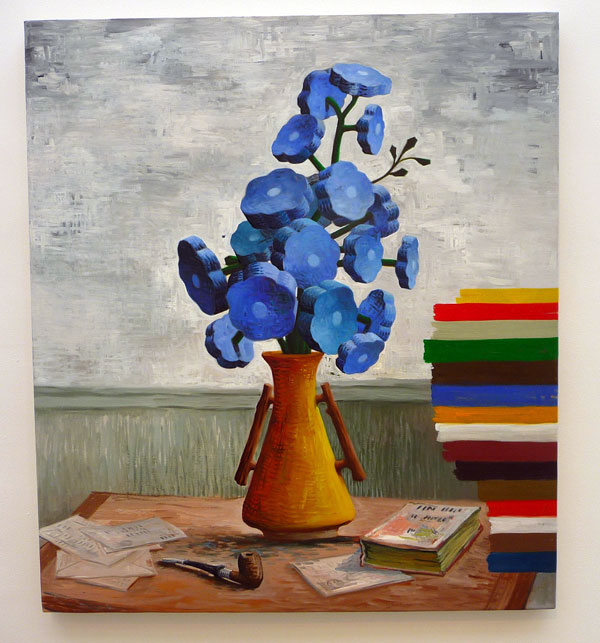
two FAUXreal-posted GIFs overlayed
Andrew Leonard mulled over Facebook's insanely expensive purchase of WhatsApp ($16 billion) in his Salon column yesterday. Leonard believes it's another Instagram move where Zuck buys a service all the kids are using because the kids aren't using Facebook. WhatsApp provides "a way to send text messages over the Internet without paying SMS charges to the phone companies," says Leonard. Now users will pay those charges to Facebook by staying within the clutch of its eager advertisers. The Salon headline writer calls this business decision "scary bold desperation," possibly one of the greatest fudge-phrases ever written. Scary for investors, certainly.
How many times can Facebook keep buying the loyalty of younger users? Till it blows up. It would be ideal if this happens before Facebook becomes permanently institutionalized in the sense of "indispensable for employers and law enforcement" (and artists, and the net art community) which is the direction it's been heading at the same time the younger demographic is bailing.
Update: Other theories about the WhatsApp sale include beefed-up access to the European market and lower income users, and, possibly related to any of the above reasons (youth, Euro, and/or income), "whatsapp has a client that runs on shitty nokia phones" (hat tip Ryz). We're happy with whatever prompts the juggernaut to wild spending sprees -- the "youth angle" is the funniest.
Update 2: According to Sarah Lacy at Pando Daily, it's all about photos: "According to the company’s own numbers [always highly suspect if we're talking about Facebook's numbers --TM], WhatsApp is processing 500 million images per day, compared to 400 million Snapchat ('snaps') per day, which could include photos or videos. For its part, Facebook processes a comparatively paltry 350 million photos a day, with an additional 55 million per day from Instagram." The near-Turing-complete user who's been finding places to park photos online for over a decade without crawling to "social" has to laugh at the economics of all this.
Update 3: The WhatsApp sale has become a Rorschach blot for commenters. Lambert of Corrente sees it as: "Here's what's special about WhatsApp and mobile -- as opposed to browser-based -- apps generally [quoting an NBC article]: 'The messaging app offers its users unlimited messaging on mobile devices for 99 cents a year after a one-year free trial. ... When you download the app, WhatsApp automatically scans through your address book and connects you with those who have WhatsApp installed on their phones.' That's the value of the deal; mining that address book data," Lambert continues. "It's even better than an email address book, because a messaging app is more intimate; more likely to be friends and family."

Above is a painting by Sally Ross, who shows in New York City, as recently as a 2010 Gallery Lelong group show, which featured the top image (found on a blog via Google images). I met the artist briefly in the 1990s and have seen and admired her work here in the NY metro area. She specializes in carefully-painted surrealistic still lifes, often where the subject is cartoonishly thickened, such as the above flowers. Her stroke and sensibility is similar to that of her brother in real life, Alexander Ross, painter of intricate green biomorphic blobscapes.

Christie's sold the smaller image above and apparently misidentifies New York's Sally Ross as a different Sally Ross, from Melbourne, Australia, who has won the Google Images battle decisively. It wouldn't be an understatement to say that the Melbourne Ross annihilates the New York Ross on Google, to such a degree that Christie's uses the tag "Australia" to identify the New York Sally Ross's painting. Yet the provenance for the Christie's image was Feature Gallery, NYC, and there are no New York shows on the Melbourne Sally Ross's resume. Also, 1969, the birthdate Christie's gives the New York Ross, is on the Melbourne Ross's resume. 'twould be an amazing coincidence if both artists had the same birth year.
Apropos of this post on recommendation engine-uity, it's what happens when you let Silicon Valley's bots make cultural determinations -- the better artist can be eclipsed even in the tastemakers' auction spaces.

this started out as a GIF of the MIT dot edu persuasion (hat tip blingscience) - I modified it
This is kind of a funny moment. Just as kids and certain superhumanly brave intellectuals are abandoning Facebook, businesses who decided it was "the internet" in terms of their business model are dealing with minor tectonic shifts of the company's own policies. Alex Pareene has an amusing article about Zuck's decision to algorithmically downgrade clickfarm headline aggregators such as "Upworthy" and "ViralNova" in people's FB news feeds, while preserving Buzzfeed as a legitimate news source, possibly because of some insider shenanigans.
A near-Turing-complete user who gathers her own news via RSS can only sneer at all the Facebook-spoonfed infants being dependent on these crappy services for information. But it's a make-or-break thing for some businesses, apparently, both on the aggregator side as well as the aggregated.
A similar edge of desperation runs through this George Packer New Yorker story about the dependency of East Coast publishing elites on the culturally braindead algorithm-writers of Amazon.com.
Which is worse, Bonesmen deciding what you read or robots? Seems to be the choice we're offered.